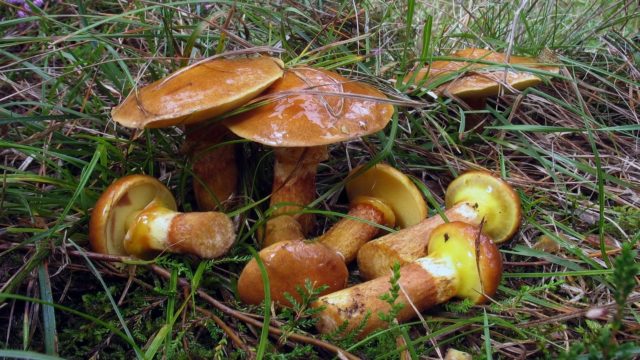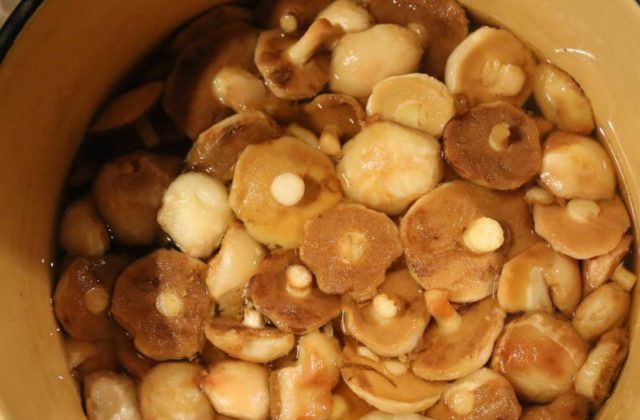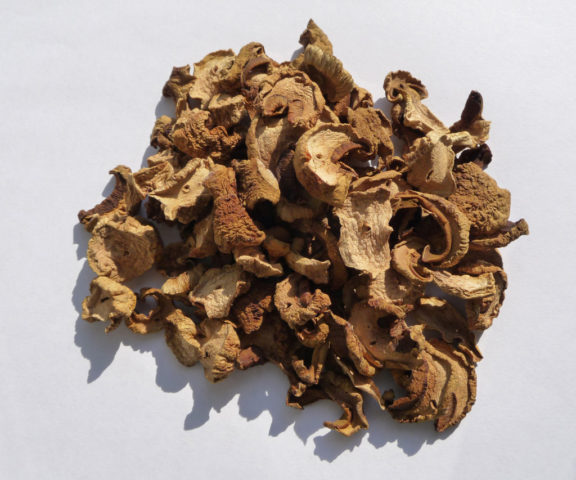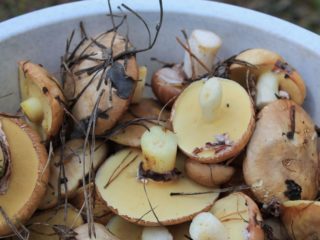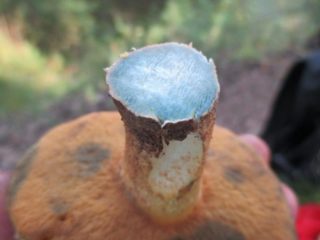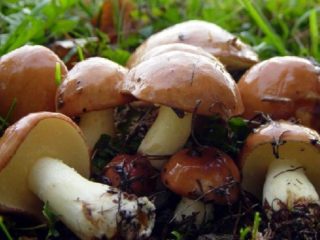Content
In warm weather with regular precipitation, boletus appears several times per season. The most fruitful period is spring and early autumn. The species grows in groups, so a bountiful harvest can be collected from a small area. It is necessary to process oil after transportation from the forest quickly so that they do not disappear. There are many options for preparing and processing the product; they choose a method according to gastronomic preferences.
Rules for collecting oil
The mushroom season begins in early summer and ends in autumn (September). Butterlets do not grow for long, after 3-4 days they age and become unusable. The collection period is about two weeks. The main congestion of the species is observed near young pines on the sunny side. These mushrooms are less common on glades and roadsides. Immature specimens are collected in an ecologically clean area. For consumption, they do not take mushrooms grown near highways, treatment facilities, gas stations, on the territory of large plants and factories. In order not to damage the mycelium, the leg is cut off with a knife.
How to process boletus mushrooms after harvesting
Processing oil after collection is a necessary measure, the product is not stored after transportation. You cannot soak the tubular look for a long period. Hats absorb moisture, lose their elasticity, become slippery, processing of such raw materials will become problematic. If the volume of the crop is small, it can be placed in the refrigerator for a day.
What to do with boletus immediately after harvest
Butter mushrooms are mushrooms with a rich chemical composition, the dominant component is protein. By its structure and shelf life, it is not inferior to animal protein. The product is stored in a warm room for no more than 8 hours, in the refrigerator for a day. During this time, the fruit body will not lose its presentation and usefulness of the composition. With a prolonged stay without processing, the protein undergoes decomposition, in the process it synthesizes toxic substances. Mushrooms can cause severe poisoning.
The main task after the delivery of the crop home is processing and preparation for drying, canning or salting, freezing is often used.
General recommendations on what to do with mushrooms after collection:
- This species has poisonous counterparts, so any mushroom in doubt is thrown away. Do not leave overripe, slug or insect infested specimens.
- A dry cloth is spread, the crop is poured onto it, sorted by size.
- The hat is covered with an oily sticky film; the remains of dry grass, needles or leaves accumulate on it. The film is removed from the fruiting body. Dry processing is recommended here, it will greatly simplify the task.
- Cut out the damaged areas and the remnants of the mycelium with a knife.
- Rinse under running water.
- Pour a thin layer onto a clean cloth to evaporate moisture.
How to process small boletus mushrooms
In young boletus, the cap is rounded, the inside is completely covered with a film, which is a serious obstacle to the penetration of insects into the tubular body. Therefore, preference when collecting is given to young specimens, in which the area of the cap is small, which means that less debris accumulates on it.
Processing small oil after harvest is less laborious process. The film does not have time to accumulate harmful substances in a short biological cycle, it is not removed from the cap. Carry out dry processing: using a sponge, small particles and adhering insects are removed from the surface. If there are fragments of mycelium on the stem, they are cut off. Washed and dried. The preparatory processing of small specimens ends here.
How to process large boletus mushrooms
Large boletus is sorted out a second time, put aside damaged by insects and worms. The processing of high-quality mushrooms is as follows:
- They clean the surface from litter and dirt.
- Remove the film.
- The lower part of the leg is cut off.
- Placed in water for 15 minutes to allow the sand and dirt to settle.
- Thrown back in a colander, when the water drains, cut into pieces.
Damaged fruiting bodies are not thrown away, processing old oils will take longer, but they can be used for frying or making soup. Initial processing of illiquid oil does not differ from intact fruit bodies. Only the already pure product is placed not in water, but in a saline solution brought to a boil. For 2 liters of liquid, put 0.5 tbsp. l. salt. The oil is left in the solution for 15 minutes, the insects will float to the surface. After the procedure, the product is washed and dried.
How to quickly process boletus
Most of the time is spent on removing the film from the surface of the cap. Processing butter before cooking will take less time if you follow a number of recommendations:
- For better separation of the film, the hands and the knife are lubricated with vegetable oil. The skin will not stick to the instrument and stain your hands.
- Use a kitchen sponge as an improvised tool. Peel off the protective layer with the hard side.
- Use a tissue or gauze. A material is applied to the cap, due to the sticky coating, it is fixed to the surface and removed together with the film.
Processing with boiling water will take a little longer, but the method is the most effective:
- The fruiting bodies are washed under running water.
- Fold into a container.
- Pour boiling water over.
- Leave for 2 minutes.
- Remove with a slotted spoon or discard in a colander.
The film does not stick to hands, it is easily separated, the raw material is completely ready for processing.
How to properly process boletus before cooking or processing
You can process butter oil for cooking in different ways. The choice depends on the purpose of processing. Freezing technology will be radically different from drying or salting. In some recipes, heat treatment is required, in others it is not necessary.
Processing oil before freezing
The fastest and least laborious way of processing is freezing. You can freeze boiled or raw butter. Recipe for processing and cooking butter:
- Remove the film from the cap.
- Soak in saline.
- Rinsed under the tap.
- Cut into small pieces.
- Boil for 15 minutes.
- Take it out of the container, lay it out on a clean cloth to remove excess moisture.
- When the product cools down, it is packed in bags or containers.
- Placed in a freezer.
You can freeze a raw product, the processing and cooking technology are the same, only instead of heat treatment, the raw pieces are washed several times.
How to properly process boletus before drying mushrooms
For drying, select specimens of medium size or small, overripe for such processing are not suitable.
The fruiting body cannot be washed. During the cooking process, the first broth in which the mushrooms are boiled is drained; debris particles may remain in it. Processing sequence:
- Rubbish is removed from the surface of the oil.
- Gently wipe the surface of the cap so as not to damage the film.
- A protective oily layer is left on the mushroom.
- Cut the mushroom into pieces.
Can be oven dried or strung on a string and hung in a well-ventilated place. Many lay out the pieces on a flat surface. The brittleness of the product will be an indicator of readiness.
Rules for processing butter oil before salting
If there are a lot of mushrooms, salting is a convenient way to process oil. The recipe provides for dry processing. The film can also not be removed, the presence of the protective layer will not affect the taste. Processing technology:
- Mushrooms are carefully processed from weed particles.
- Layers are placed in an oak barrel.
- Sprinkle each layer with salt.
- Put oppression on top.
Mushrooms, under the weight, will give juice, which will completely cover them. Pre-boiled butter is not boiled.
How to properly process oil for pickling
Mushrooms are pickled in glass jars, they should look aesthetically pleasing, so the film is removed from the surface. The sequence of processing oil at home is as follows:
- Mushrooms are washed.
- Cut into small pieces.
- Boil for 10 minutes.
- Thrown back in a colander, the water should drain completely.
Prepare the marinade according to the recipe, dip butter oil into it. When the product is ready, it is packed in jars and sealed with lids.
How the boletus is processed before being cooked
Before preparing the dish, the butter is heat treated. The film is preliminarily removed, the product is washed well. Before frying:
- boil for 15 minutes, drain the water;
- mushrooms are spread in a deep frying pan and fried until the moisture completely evaporates;
- add butter or vegetable oil;
- bring to readiness;
- spices are added to taste.
Storage rules and periods
Subject to the processing technology of butter oil, they do not lose their taste and chemical composition for a long time. Salted mushrooms are stored in the basement for one year. A prerequisite is that the brine must completely cover the product.
Frozen mushrooms are usable within six months. They are placed in a maximum freezer. The temperature must remain constant, the product is hermetically sealed. After defrosting, the raw materials are not re-placed in the freezer section.
Dried mushrooms are stored at minimum air humidity in a well-ventilated area. If necessary, dry in the oven. The shelf life of such a product is unlimited, the main thing is to prevent the appearance of mold on the surface.
Pickled butter is stored in a basement or storage room at a temperature not higher than +10 0C with minimal illumination.
Conclusion
It is necessary to process the oil after delivery home as soon as possible, since they are not stored for more than 24 hours. After the specified period, they become unusable. Fruit bodies are processed in several ways: freezing, pickling, salting, drying. Below, as an illustrative example, a video is presented on how to process and prepare boletus.
